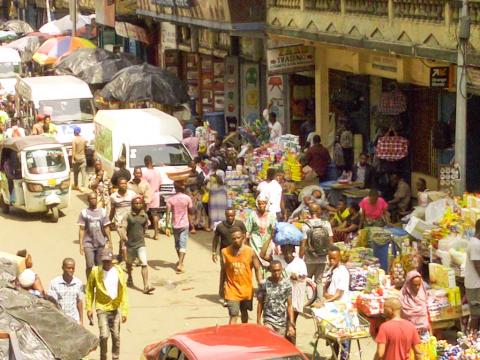By Mohamed Jaward Nyallay
Importers and business experts have warned of tough times ahead if strategic moves aren’t taken to cushion the economic effect of the ongoing global Coronavirus pandemic in Sierra Leone.
The government has already recognized the danger and has announced a stimulus package. But business people, particularly importers, say the plan announced is not enough.
The [Central] Bank of Sierra Leone (BSL) last week said it would pump Le500billion into the economy to help businesses give out loans to cushion the effect particularly on small businesses.
But this amount, says Rashid Conteh of the Sierra Leone Importers Association, is a drop in the ocean compared to what businesses really need. He says they would need much more to help them import as much essential goods into the country as possible.
“With the measures that they (BSL) have announced, it is a little bit too small when you talk about the economy of Sierra Leone. If you compare this to America for example, how much billion they have put into the economy, you are looking at US$ 85 billion,” Conteh, who is the Secretary General of the association, told Politico.
“As a block, we are the single largest taxpayers in the country. More than 85% of things used in this country are imported and we pay taxes for them,” he added.
Last week, Minister of Finance Jacob Jusu Saffa also unveiled plans been considered by the central government towards easing pressure on business, including tax breaks and deferrals.
The Coronavirus outbreak has forced many countries into lock down, and share prices have been falling, affecting production outputs across the globe. This has particularly affected countries like Sierra Leone which rely heavily on importation for consumption.
The importers association say already the volume of import has dropped by 60%.
Conteh says bringing goods into the country is also getting much more expensive because of delay in shipping.
“One problem we the importers are facing is, usually we import some of these essential commodities through containers, but because of the Coronavirus, we now have to airfreight them. Airfreight cost is extremely high compared to containers. So you are looking at another 50% increment on the cost of bringing goods into the country,” he said.
According to him, the cost of bringing containers into the country now is around US$6000 and he said airfreighting goods might cost three times more, citing other charges.
As a consequence, some importers are now switching from importing luxury goods to ordering masks and sanitizers to meet growing demand for these lifesaving commodities in the country.
But as important as these are, they can’t substitute edibale commodities, like rice, which is the local staple and for which Sierra Leone relies almost entirely on imports.
Christopher John Foster, President of the Sierra Leone Chamber of Commerce, also warned of an imminent shortage of goods because of delays in shipment, which mostly originates from China.
“Production in China came to a halt and India was short of containers. So, all those who were ordering goods from India had delays. That is the knock-on effect. You will start to see certain products will be short in the market here because of the supply chain that is broken,” Foster told Politico.
The Coronavirus pandemic started in China late last year, before spreading to now over 150 countries, according to World Health Organization figures. But the Chinese has since contained the local transmission of the virus that is also known as COVID-19.
Foster said even when China has since started production, after overcoming the virus, it will take time for the international shipping system to be fully functional.
When asked if Sierra Leone’s current stock of essential goods might be enough to keep the population going in the event of the lockdown, he said: “We do not have enough. We will have to go into some sort of rationing.”
Foster however praised the government’s effort to cushion the possible effects of the virus through the measures it has announced.
Sierra Leone remains the only country in West Africa to have not recorded any case of the coronavirus. Amidst the situation, the government is leaving no chance for complaisance.
On Tuesday, President Julius Maada Bio declared a 12-month long State of Emergency in the government’s latest effort to prevent the virus from entering the country.
In his declaration statement, Bio warned businesses against hoarding and price hike, a commonplace in situations like this.
Foster said the Chamber had also made similar appeal for its members to “behave in a corporately responsible manner.”
“It encompasses many things, including hoarding and not doing price hiking. It sends the wrong signal to the public,” he said.
Copyright © 2020 Politico Online








